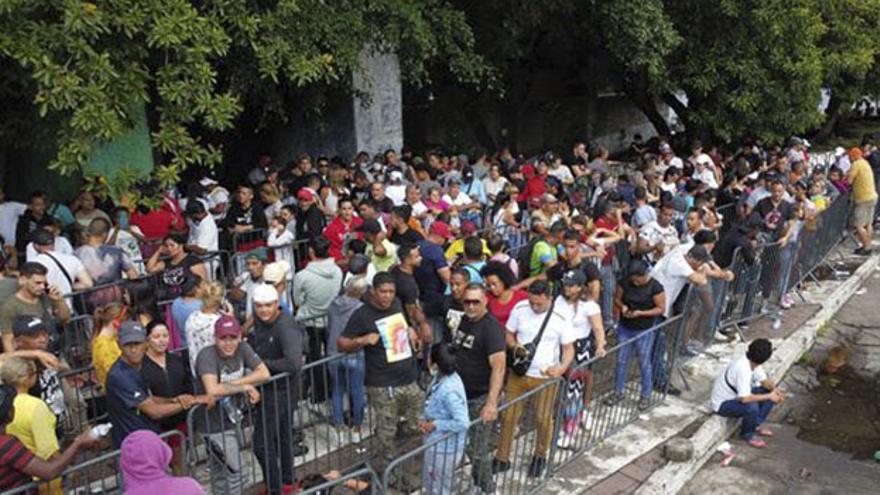
![]() EFE (via 14ymedio), Juan Manuel Blanco, Tapachula, 6 August 2023 — Restlessness and hope grow on Mexico’s border with Central America a week after Washington’s announcement about a new space in southern Mexico to process applications for asylum and employment of migrants seeking to go to the United States.
EFE (via 14ymedio), Juan Manuel Blanco, Tapachula, 6 August 2023 — Restlessness and hope grow on Mexico’s border with Central America a week after Washington’s announcement about a new space in southern Mexico to process applications for asylum and employment of migrants seeking to go to the United States.
While some migrants hope to achieve the goal of reaching the United States, activists reject the next “multipurpose international space” of the Mexican Government in Tapachula, on the southern border, because it “denigrates” migrants with new bureaucratic burdens.
The Cuban Dadier Hernández Morfin told EFE that he hopes this center will help migrants reach the United States through legal channels and put an end to the risks and drama that they go through in their exodus.
“Through that we could fulfill our goals and dreams and know that all the sacrifice is not in vain, because it will help us a lot to easily reach the United States,” he said.
“Likewise, it would reduce the risks of migrants losing their lives, being kidnapped, being killed, having their money taken on the way and being tortured,” he added.
Mexican President Andrés Manuel López Obrador confirmed on Tuesday an agreement with the United States for that government to accept asylum applications from migrants who are already in Mexico, which in turn will install a “multipurpose international space” in the south of the country to serve migrants.
The United States announced last week that it will accept asylum requests from citizens of Cuba, Haiti, Nicaragua and Venezuela who are already in Mexico waiting to cross into the United States, according to an agreement after a meeting in Mexico City between an American delegation and López Obrador.
Despite the novelty, activist Luis Rey García Villagrán, director of the Center for Human Dignity (CDH), argued that the shelters are “denigrating,” and he questioned the usefulness of the new center, which he considered an imposition by the United States.
“The federal (Mexican) government has not yet defined whether this is true or not. We believe that the immigration policy of the United States is domineering. They always want to impose, and the only thing the federal government can do is give work to those who want to work,” he said.
Meanwhile, Rafael Alegría López, defender of the rights of migrants, remarked that a center of this magnitude must be a priority because Tapachula has become “an immigration prison” of corruption and violation of human rights suffered by migrants.
“The migratory flow that the city is experiencing is growing day by day. Three hundred, 400, 800, 2000, 3,000 or 4,000 of various nationalities arrive, so there should be a control when they enter the country,” he added.
The activist asked López Obrador’s government to fulfill its promise to employ migrants, as the president reiterated this week.
“This shelter could show good intention by the Government, but on the other hand it is worrying that, as the greater migratory flow is concentrated, services may become more expensive,” he considered.
The Secretary of Foreign Affairs, Alicia Bárcena, visited Tapachula on Thursday and warned that there are still no definitive details about the site, and she also awaits the collaboration of the UN and other international organizations to treat migrants in a dignified manner.
But García Villagrán commented that, with the new center, they put “let the foxes in the chicken coop,” in reference to the fact that human traffickers [polleros] and organized crime will use it to take advantage of migrants.
The Guatemalan Douglas Brayan Velázquez, whom the United States has deported four times, said that he will try to cross again, despite the risks.
“I would ask the United States Government to behave better with us because they treat us like criminals when we turn ourselves in to Migration. For them we are not emigrants, but criminals, and it’s really hard for us to take,” he complained.
Translated by Regina Anavy
____________
COLLABORATE WITH OUR WORK: The 14ymedio team is committed to practicing serious journalism that reflects Cuba’s reality in all its depth. Thank you for joining us on this long journey. We invite you to continue supporting us by becoming a member of 14ymedio now. Together we can continue transforming journalism in Cuba.
